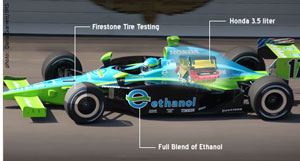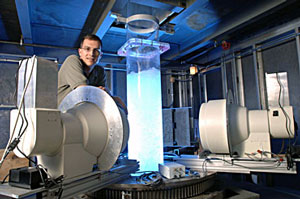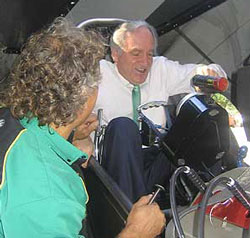 The University of Missouri-Columbia is testing a mixture of corn cobs and coal in the University’s Power Plant, which could reduce emissions, lower fuel costs and create additional income for farmers. The power plant, which burns up to 170,000 tons of coal each year, is conducting the first of several tests of a blended fuel in which up to 10 percent of the mixture is made of corn cobs.
The University of Missouri-Columbia is testing a mixture of corn cobs and coal in the University’s Power Plant, which could reduce emissions, lower fuel costs and create additional income for farmers. The power plant, which burns up to 170,000 tons of coal each year, is conducting the first of several tests of a blended fuel in which up to 10 percent of the mixture is made of corn cobs.
According to a university release, because corn cobs are a by-product of Missouri’s expanding corn industry, their use is ideal. Corn cobs are clean burning and have a higher heating value, or more energy to release, than most other biomass fuels, such as grass. The heating value of corn cobs is about 75 percent of the heating value of coal.


 South Dakota-based
South Dakota-based  Most ethanol in the US is made from corn while in Brazil its sugar cane – but wheat is the feedstock of choice for our neighbors to the north.
Most ethanol in the US is made from corn while in Brazil its sugar cane – but wheat is the feedstock of choice for our neighbors to the north. Here’s a screen shot from the home page of the
Here’s a screen shot from the home page of the  Simmons, who drives the No. 17 Ethanol-sponsored car co-owned by 1986 Indianapolis 500 winner Bobby Rahal and late-night talk show legend Dave Letterman, said changes in the performance of the car, with the new fuel and engine combination, are noticeable.
Simmons, who drives the No. 17 Ethanol-sponsored car co-owned by 1986 Indianapolis 500 winner Bobby Rahal and late-night talk show legend Dave Letterman, said changes in the performance of the car, with the new fuel and engine combination, are noticeable.

 Here’s a
Here’s a  Iowa State University researchers are working to cut the use of natural gas from the production of ethanol, which would make it less expensive to make since natural gas is the second largest expense in the ethanol process behind the corn.
Iowa State University researchers are working to cut the use of natural gas from the production of ethanol, which would make it less expensive to make since natural gas is the second largest expense in the ethanol process behind the corn. Iowa Senator Tom Harkin, pictured here squeezing into an ethanol-powered funny car, is calling for a study into distributing ethanol by pipeline.
Iowa Senator Tom Harkin, pictured here squeezing into an ethanol-powered funny car, is calling for a study into distributing ethanol by pipeline.
 Georgia Governor Sonny Perdue this week proposed a sales tax exemption for materials and equipment used in the construction of biofuel facilities in Georgia. According to a
Georgia Governor Sonny Perdue this week proposed a sales tax exemption for materials and equipment used in the construction of biofuel facilities in Georgia. According to a 